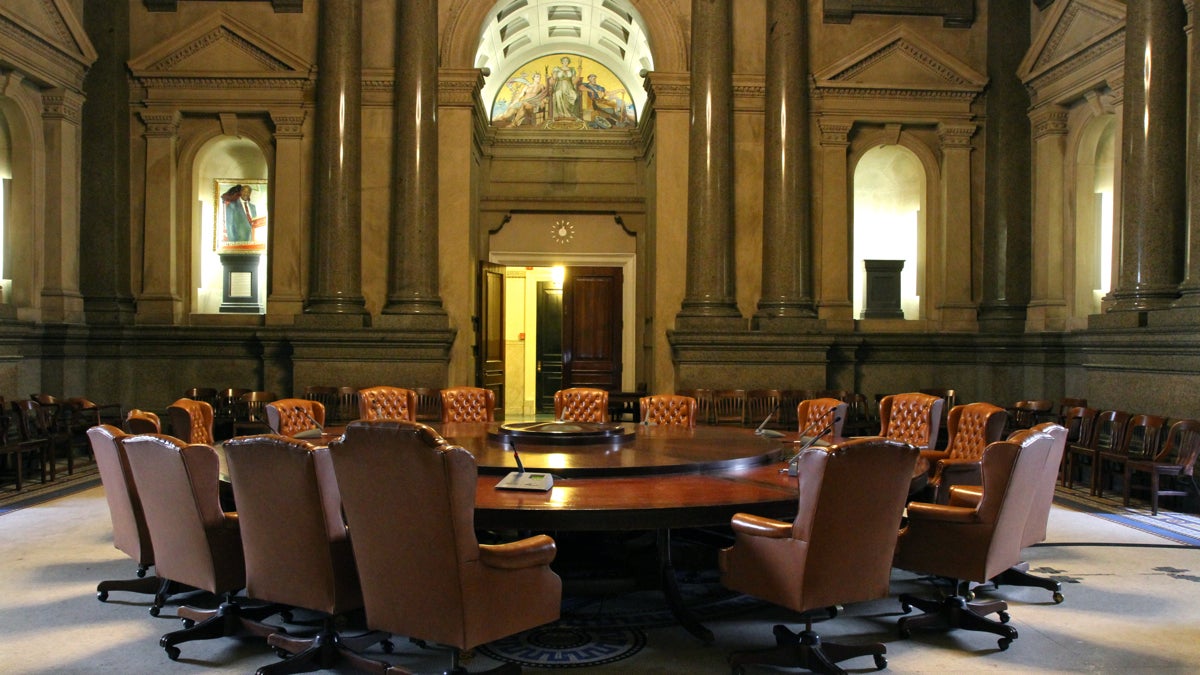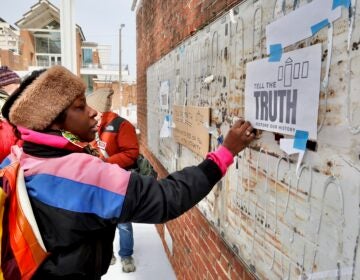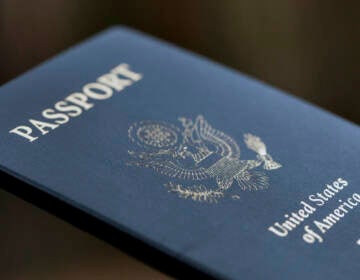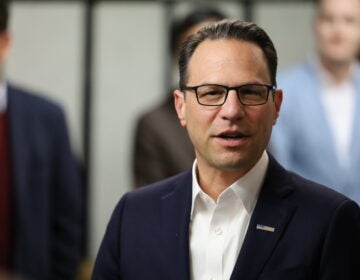A who’s who in the race for Philly City Council
Listen
City Council Caucus Room in Philadelphia's City Hall (Emma Lee/WHYY)
As disagreements in recent years between Philadelphia’s mayor and City Council have shown, Council’s 17 members can collectively wield a lot of power.
Check out our Pocket Voters Guide here.
(Exhibit #1 from this year: The foiled sale of Philadelphia Gas Works, a situation in which Council refused to even hold a hearing on Mayor Michael Nutter’s plan to sell the utility to a private company.)
In Tuesday’s primary, all 17 council seats are up for re-election, but only a few races are expected to be competitive.
Of the 10 district seats, six council members are running unopposed; so, consider those champagne corks already popped.
Also see our Pocket Voters Guide
De facto coasting to new, four-year terms will be Mark Squilla (1st District), Jannie Blackwell (3rd District), Curtis Jones (4th district), Council President Darrell Clarke (5th district), Bobby Henon (6th district), and Brian O’Neill (10th district).
Only two district races feature real competition.
The 2nd district – which covers Southwest Philadelphia and parts of South Philly that have rapidly gentrified – has been the most hotly contested race. Incumbent Kenyatta Johnson faces real estate developer Ori Feibush.
The 7th district – which covers a large swath of North Philly – has also been competitive. Incumbent Maria Quinones Sanchez has won twice without the backing of the party establishment. Her competitor, Manny Morales, found himself in hot water after word spread about bigoted posts on his Facebook page. Morales says he wasn’t responsible for those posts.
In the 8th district, Incumbent Cindy Bass faces opposition from Michael Galganski, who’s running in a party of his own creation, the Free Dominion Party.
With Councilwoman Marian Tasco retiring, state Rep. Cherelle Parker is expected to fill the vacancy in the 9th district. She’ll face client relations manager Kevin Strickland, a Republican, in the general election in the fall.
At-large, in charge
The entire city can vote for seven at-large council members.
Voters registered either Democrat or Republican can vote for five candidates in their party. Top vote getters win the seven seats, but the city charter ensures that at least two of these seats go to the minority party.
In Philadelphia, where Democrats outnumber the GOP by 7-to-1, typically the at-large seats split five for Democrats and two for Republicans.
The current Democratic incumbents are Blondell Reynolds Brown, Wilson Goode Jr., Bill Greenlee, and Ed Neilson.
Based on name recognition and connections to power brokers, incumbents typically win. But in this race, at least one newcomer will take a seat because Jim Kenney retired from his at-large seat to run for mayor.
A big field of newcomers is vying for the at-large spots.. Of these, eight are considered to have a shot based on fundraising and name recognition. Earlier this week, we analyzed the at-large candidates’ campaign finance reports, showing who gave what to whom.
Sherrie Cohen can be seen as the “establishment” candidate, as she’s the only newcomer backed by the city’s Democratic Party.
She’s the daughter of the late Councilman David Cohen and sister of State Rep. Mark Cohen. She came in sixth when she ran for an at-large seat four years ago.
If a winner, she’d become the first openly gay candidate to be elected to a citywide office in Philadelphia.
“I am a lifelong economic and social justice activist, and I am running to take my passion and my commitment to City Hall,” she said.
Like her father, Cohen is a stalwart progressive. She left her job as an attorney representing low-income renters for the nonprofit Tenant Union Representative Network (TURN) to run for council. She also chaired the Coalition for Essential Services, a group of union and community activists that fought budget cuts, including Mayor Michael Nutter’s plan to shutter 11 city libraries in the wake of the great recession.
If elected, Cohen says she would push for a locally-controlled school board. She also wants to increase the minimum wage to $15/hour and require developers to include affordable housing in new buildings.
Endorsements include: Former mayor and former Pa. Gov. Ed Rendell, Democratic City Committee, 5th Square, National Organization for Women Philadelphia, Action United, Liberty City LGBT Democratic Club.
Allan Domb is a major city real-estate developer running a million-dollar campaign, more than half of which is coming from his own wallet.
With double the cash of his nearest counterpart, Domb has used the advantage to sell himself to voters early and often in television commercials.
If elected, Domb vows to donate his $127,000 council salary to the school district. He believes he can drive up education funding by spearheading a new initiative to collect the city’s delinquent taxes, modeled after a program in New York City.
He hopes to help drive better educational outcomes by convincing more local businesses to adopt high schools – effectively giving students once-a-week internships.
Domb also wants to raise the minimum wage to $10.10/hour, which he says would immediately lift tens of thousands of Philadelphians out of poverty. Domb believes he can win the cooperation of the city’s business community for such a measure, citing how he changed the mind of restaurateur Steven Starr (his business partner) on the matter.
Domb also says he’ll push to create a Navy Yard-like development in Northeast Philadelphia.
“Jobs create growth. Jobs give people pride. It’s all about employment,” said Domb. “In government, we need to increase opportunities. I would set a goal: We have 400,000 people in poverty, and our goal should be, four years from now, to get that number down to 300,000 people in poverty.”
Endorsements include: Former mayor and former Pa. Gov. Ed Rendell, Philadelphia Chamber of Commerce.
Derek Green stepped down in February as special counsel to 9th District Councilwoman Marian Tasco, who is retiring this year after 28 years in office.
While he was on Tasco’s staff, he contributed to a bill that helped curb predatory lending, in addition to writing resolutions that dealt with HIV the Affordable Care Act.
That gig followed stints as an assistant city solicitor, assistant district attorney and a small business lender. He ran unsuccessfully for Council at-large in 2007.
Green’s mother taught in Philadelphia public schools for 31 years.
“We have a little over a $4 billion budget, but there’s areas of the budget that can be tweaked in terms of how we allocate dollars,” he says, noting he also wants to boost support for students with special needs, like his son who was diagnosed with autism at 30 months.
Green and his wife run a women’s shoe store in Mt. Airy called Soles, an experience he says opened his eyes to the red tape small business owners in Philadelphia must contend with.
“Just getting a tax account and a business privilege license was really a challenge,” he says. “I can only imagine if you’re a young person trying to start a business.”
Endorsements include: Greater Philadelphia Chamber of Commerce, Philadelphia 3.0 and several unions including the Philadelphia Fire Fighters’ and Paramedics.
Helen Gym is a long-time public education advocate who organizes grassroots campaigns on issues of school funding and policy. She knows the ins and outs of city schools and district governance as well as probably anybody in Philadelphia, and has gained the support of many top district employees past and present.
She co-founded of Parents United for Public Education, as well as The Philadelphia Public School Notebook. She had a short stint as a teacher in a Philly school and also started a high-performing charter school that’s centered on Asian heritage.
She was also a leading voice against the creation of a new Phillies ballpark in Chinatown, arguing it would disrupt the community.
In 2007, the Inquirer selected Gym as its “Citizen of the Year.” Last year, the White House tapped her for the Cesar E. Chavez Champion of Change award.
“For twenty years I’ve been advocating on the outside about what it means for marginalized communities to raise up their voices, to become visible in a city that’s long overlooked them,” said Gym. “I think I’m the right person to bring forward a community agenda that doesn’t just change the face of who’s in City Hall, but changes the way we look at politics in this city.”
She has the backing, and the big cash that comes with it, from the teachers union. She’s also raised more money in small donations under $50 dollars than any candidate this year – including in the mayor’s race.
Gym’s forceful point of view has no doubt earned her a slate of staunch critics. She’s had several high-profile clashes recently with School Reform Commissioner Bill Green, a former at-large councilman.
Of all the city council candidates, she’s the only one who’s developed a comprehensive plan to raise immediately the new revenue that the school district says it needs. Her three children attend Philadelphia public schools.
Endorsements include: Philadelphia Inquirer, Philadelphia Federation of Teachers, Commonwealth Association of School Administrators (Philly principals) 5th Square, Action United, Liberty City LGBT Democratic Club, National Organization for Women, Network for Public Education, Teamsters, District Council 47.
Frank Rizzo Jr., wants to rejoin City Council as a Democrat after a stint as a Republican from 1995 to 2011. His previous tenure wasn’t based much on policy, but largely on constituent services – getting day-to-day things done for people.
His father was mayor in the 1970’s.
“I tell people, ‘Try to use the system, but if that doesn’t work, come to me,'” said Rizzo in a recent phone interview. “The majority of people, they want things cleared up and out of the way. They don’t want to be told month after month after month, ‘We’re working on it.'”
Rizzo lost his spot on Council in 2011, due in large part to his participation in the city’s DROP plan, a perk where city workers can retire for a day and receive a lump-sum pension payout.
Of his DROP decision, Rizzo says now: “It was legal. It was morally proper, but it was stupid politically.”
Rizzo wants a locally-controlled school board. He also believes the school district can meet its budget needs by making further internal cuts.
Paul Steinke was the general manager of Reading Terminal Market for 13 years – overseeing its modernization. He convinced merchants to open on Sundays, brought in some new tenants, and spearheaded renovations to the east end of the market. He stepped down from that post recently to make his run for an at-large seat.
Steinke has built his campaign around his experience helping small businesses and jumpstarting economic development. Before Reading Terminal Market, Steinke was the first executive director of the University City District. Before that, he was finance director for the Center City District.
He’s also very active in the LGBT community and, like Cohen, would be the first openly gay person elected to citywide office in Philly.
Steinke says he wants to be known as the “corridor councilman” and find ways to stimulate growth in the city’s sagging commercial corridors. He cites Philadelphia’s high poverty rate, as well as the high wage and business-net-profit taxes as detriments to the city’s future.
“It’s time to take some risks and try and move in the opposite direction, especially at a time when the appetite for urban living is on the upswing,” he said.
If you subtract money that candidates have loaned themselves, Steinke has raised the most cash – doing so without relying heavily on big checks from unions or political committees.
Endorsements include: Former mayor and former Pa. Gov. Rendell, Philadelphia Chamber of Commerce, Philadelphia Inquirer, National Organization for Women Philadelphia, Philly 3.0.
Isaiah Thomas is the associate dean of students and athletic director at Sankofa Freedom Academy charter school in lower Northeast Philadelphia. Thomas is very involved in the neighborhood of Frankford, where he runs a free basketball camp and other mentoring programs.
He ran for City Council in 2011 at the age of 26 and lost, but since then he’s earned the support of several powerful backers, including many city unions.
He’s a lifelong Philly resident who attended district-run neighborhood schools. Thomas sees himself as a representative of middle class black Philadelphians who’ve grown up “in a climate of stop and frisk” going to “schools where young people aren’t receiving a quality education.”
“Who better to advocate for that community than a person who knows first hand what it means and what it feels like to experience those injustices?” he said.
Thomas hopes to start a city foundation that would help fund schools, one where philanthropists could be sure that donations will reach children in need. He also says he’d focus on connecting grassroots neighborhood organizations with existing city services.
After his failed 2011 bid, Thomas worked for campaigns supporting city controller Alan Butkovitz and Congressman Brendan Boyle. Previously, he was a legislative assistant to former State Rep. Tony Payson.
Endorsements include: Philadelphia Inquirer, Black Clergy, Philadelphia 3.0, District Council people Maria Quinones-Sanchez and Curtis Jones. City Controller Alan Butkovitz, Teamsters, Laborers, AFL-CIO, Action United.
Dilworth-Paxson attorney Tom Wyatt can be seen as kind of a crossover candidate.
He’s got cache with big business based on his work litigating mergers and acquisitions, but he also has credibility when it comes to schools.
Before Dilworth-Paxson, Wyatt was the chief ethics and compliance officer and securities counsel at American Water Works in New Jersey, the nation’s biggest private utility.
Wyatt also heads of the education committee for the Passyunk Square Neighborhood Association, and he’s very invested in the neighborhood school there, Andrew Jackson Elementary, where he plans to send his two young children.
Like Gym, Wyatt has teaching experience, having served in Teach for America in the Mississippi Delta.
“My biggest strength, I’ve been told, is my ability to deal with difficult situations and difficult personalities and collaborate, and let the best ideas percolate and prevail,” he said.
He was born in Bloomsburg, Pa, and raised mainly in Colorado. He earned his law degree at University of California at Berkeley before securing a position at the Philadelphia law firm Morgan, Lewis & Bockius.
He and Domb are the only two candidates to have a television commercial.
This disclosure: he’s received campaign contributions from Randi Marrazzo, wife of WHYY President and CEO Bill Marrazzo. Wyatt is also a member of WHYY’s community advisory board.
Endorsements include: Philadelphia Inquirer, The 5th Square, Philadelphia 3.0
GOP
The two Republican incumbents holding at-large seats are David Oh and Dennis O’Brien.
They’re favored to win but there are several challengers, including Al Taubenberger, the longtime director of the Greater Northeast Philadelphia Chamber of Commerce, who narrowly lost to David Oh in the last cycle.
Far Northeast Philly resident and steamfitters union member Dan Tinney will also be on the ballot, as will retail executive Terry Tracy, Cheyney University track coach James Williams, and former state deputy attorney general Matt Wolfe.
Katie Colaneri contributed to this report.
WHYY is your source for fact-based, in-depth journalism and information. As a nonprofit organization, we rely on financial support from readers like you. Please give today.





